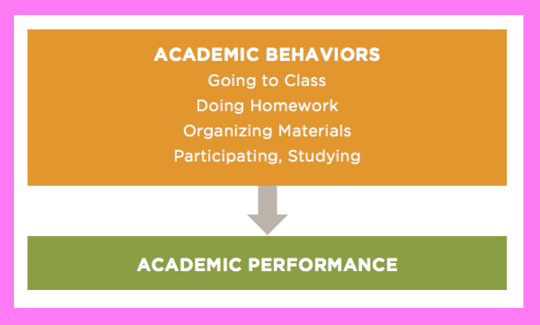


Relationship between academic behaviors & academic performance:
- attendance and study habits are better predictors for high grades than test scores and demographics
- small differences in attendance can have large effects on performance
- time spent on homework positively impacts performance
- academic behaviors directly influence grades because grades often measure products of academic behaviors
- indirectly, academic behaviors affect grades by improve students’ ability to understand and produce high quality work and improve rapport between students and teachers
How does classroom context shape academic behaviors?
- can affect behaviors indirectly by enhancing other related non-congitive factors such as student confidence, student engagement, and student study skills
- can affect behavior directly through behavioral expectations and strategies
Strategies for developing academic behaviors:
- closely monitoring and providing support on student behaviors such as classroom attendance can positively impact them
- school-wide initiatives can work – especially those aimed at improving student-teacher relationships
- some other strategies (whose effects have not been researched) include:
- requiring students to write assignments into planners
- starting homework assignments in class to get students started
- providing clear and explicit instructions for assignments
Summary of research:
- academic behaviors are the most proximal non-cognitive factors related to student performance
- there are many indirect ways to improve academic behaviors
- academic behaviors strongly influence grades
- academic behaviors are malleable
- little evidence that working solely on academic behaviors can eliminate gaps related to race and gender

Academic behaviors such as class attendance, homework completions, and active classroom participation directly and indirectly affect classroom performance. Because 4 other non-cognitive factors realize academic success through academic behaviors, there are multiple ways (direct and indirect) to improve academic behaviors. Implementing strategies for improving student academic behaviors can improve their performance.

Preparation Steps
- Create character learning targets related to key academic behaviors
- Create learning activities and assessments related to character learning targets
Early Implementation Steps
- Implement learning activities and assessments related to character learning targets that relate to academic behaviors
- Measure academic behaviors to see how they relate to strategies and student performance
- Have students track data and reflect on patterns that relate academic behaviors to strategies and academic performance
Advanced Implementation Steps
- Use strategies like standards based grading tied to character learning targets to track and enhance skills related to key academic behaviors
- Have students identify the strategies that most improve their academic behaviors and incorporate these into their personal routines

- Agency articles
